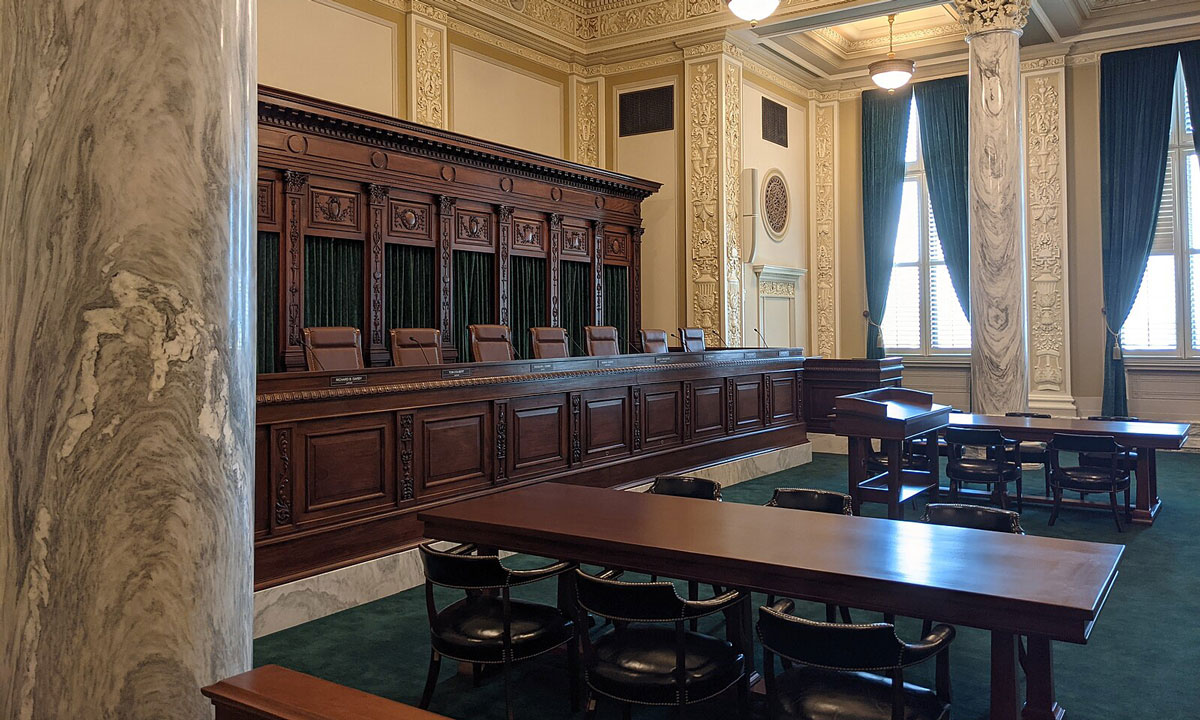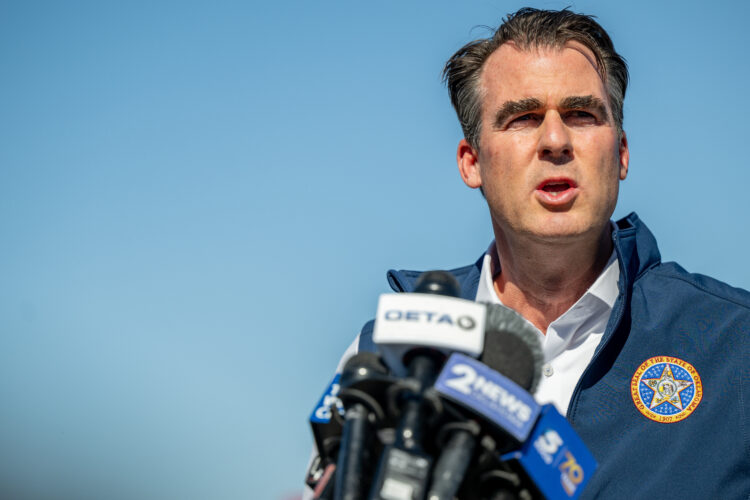Oklahoma Supreme Court Knocks Down Bid for Virtual Catholic Charter School
GOP Gov. Kevin Stitt says he’s 'hopeful' a U.S. Supreme Court more hospitable to religious schools will take up the case.

Updated
A first-of-its-kind public Catholic school proposed for Oklahoma students is unconstitutional and can’t open, the state Supreme Court ruled on Tuesday, scuttling plans by the Catholic Archdiocese of Oklahoma this August to open a virtual K-12 charter school named for the patron saint of the internet.
St. Isidore of Seville Virtual Charter School was already recruiting staff and registering students, officials said earlier this month — and it was awaiting about $1.2 million in state funds, due next week. But in a closely watched 6-2 ruling, the state’s high court said the Statewide Virtual Charter School Board’s vote last year to approve the school violates both the Oklahoma and U.S. constitutions, as well as state law, which requires public schools to be nonsectarian.
“Enforcing the St. Isidore Contract would create a slippery slope and what the framers warned against — the destruction of Oklahomans’ freedom to practice religion without fear of governmental intervention,” the justices wrote.
The court directed the board to rescind its contract with St. Isidore, but the case will almost certainly be appealed, possibly as far as the U.S. Supreme Court.
In a statement, the Archdiocese said the ruling was “very disappointing for the hundreds of prospective students and their families from across the state” hoping to attend the school this August.
The Archdiocese said it will consider its legal options, but that it remains committed to its belief that St. Isidore “could still be a valuable asset to students, regardless of socioeconomic, race or faith backgrounds.”
It said the school has received 200-plus applications for admission.
Oklahoma Attorney General Gentner Drummond, who sued last October to stop the school from opening, said Tuesday’s decision was “a tremendous victory for religious liberty,” ensuring that Oklahomans “will not be compelled to fund radical religious schools that violate their faith.”
The framers of both the U.S. and state constitutions “clearly understood how best to protect religious freedom,” Drummond said: “by preventing the State from sponsoring any religion at all. Now Oklahomans can be assured that our tax dollars will not fund the teachings of Sharia Law or even Satanism.”
In a court hearing on the school in April, Drummond said members of Oklahoma’s Virtual Charter School Board “betrayed their oath of office” in June 2023, when they voted 3-2 to approve a charter with the Catholic church to open the school.
Drummond told the justices he couldn’t get behind the state’s plan to begin transferring public funds, in what would have been a matter of days, to St. Isidore. “On July 1,” he said, “we will violate the law.”
The attorney for the school said St. Isidore is a private entity, and signing a contract with the state did not turn it into a public one.
It’s not clear what Tuesday’s ruling means for a second court case brought by a coalition of parents and advocates, including the ACLU, which is seeking to block the school from opening or receiving public funds.
In that case, slated for a July 24 hearing in an Oklahoma County district court, opponents argue that the school will discriminate against LGBTQ students and those with disabilities, as well as families and staff who don’t follow Catholic teachings.
Charters ‘may not be religious institutions’
Tuesday’s ruling represents a huge, but perhaps temporary, victory for those who maintain that charter schools are public schools, subject to traditional separation of church and state.
Eric Paisner, acting CEO for the National Alliance for Public Charter Schools, said the ruling affirmed “the unconstitutionality of religious public schools,” calling it “a resounding victory for the integrity of public education” that protects families’ constitutional rights.
Derek Black, a law professor at the University of South Carolina, called the ruling “a masterclass in cutting through the rhetoric that has muddied legal waters in recent years. The Court makes clear that charter schools are not private schools and must comply with the federal constitution like any other public school.”
Black said the court also offered important historical nuance: While proponents of religious schools claim bans on funding them are born of “religious bigotry,” he said the Oklahoma high court explained that Oklahoma’s original constitutional limit on funding religion “was really an attempt to prevent government from sinking its teeth into religion.”
Supporters of the school say that since it’s a school of choice, the state isn’t forcing any student to attend, so it isn’t establishing religion. And they maintain that public funding of charters can’t exclude religious schools.

Oklahoma Gov. Kevin Stitt said government agencies “can’t choose who gets state dollars based on a private entity’s religious status.”
He said the decision “restricts the choices available to Oklahomans,” but that he remains “hopeful the U.S. Supreme Court will hear the case and grant St. Isidore the right to establish their school.”
John Meiser, director of the Religious Liberty Clinic at Notre Dame Law School, which is representing St. Isidore in the lawsuit, said the school is considering its legal options. He said the court’s “decision to condone unconstitutional discrimination against religious educators and the children they serve is one that the school will continue to fight.”
St. Isidore, he said, “merely seeks to join Oklahoma’s diverse array of charter schools, bringing educational choice and opportunity to communities and families in need.”
The controversy over the school takes place amid a larger effort by Oklahoma officials to ensure that public school students whose parents approve receive religious instruction during the school day. Stitt earlier this month signed a law saying districts can allow students to take up to three religious-related classes each week and receive elective credit.
But Oklahoma State Superintendent of Public Instruction Ryan Walters, a supporter of the effort, has sought to cut access to such classes by non-traditional religious groups. He warned that the Satanic Temple, which plans to make its Hellion Academy of Independent Learning available to students, is not welcome. In 2019, the Internal Revenue Service granted the temple tax-exempt status, but Walters has said he doesn’t consider satanism a religion.
In a statement, Walters said the high court “got it wrong,” misunderstanding key cases involving the First Amendment and discrimination against Christians based on their faith. “Oklahomans have demanded school choice, not religious targeting,” he wrote.
Walters said contracting with a charter school doesn’t violate the Establishment Clause of the First Amendment, adding that enrollment demand for St. Isidore proves that Oklahoma parents “want more choices for their kids’ educations — not fewer.”
74 senior writer Linda Jacobson contributed to this report.
Get stories like these delivered straight to your inbox. Sign up for The 74 Newsletter


